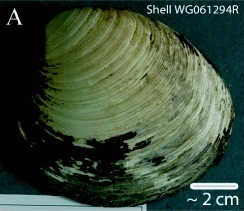Ming (clam) facts for kids

Left valve of the shell, taken in 2006. The clam was 507 years old when captured.
|
|
| Other name(s) | Hafrún |
|---|---|
| Species | Arctica islandica (ocean quahog clam) |
| Sex | Unknown |
| Hatched | c. 1498/1499 Off the coast of the Crown Dependency of Iceland, Kingdom of Norway, Kalmar Union |
| Died | (aged 507) Off the coast of Iceland |
| Cause of death | Freezing |
| Known for | Oldest individual animal ever discovered |
| Named after | Chinese dynasty during which it was born |
Ming (born around 1498 or 1499, died 2006) was an ocean quahog clam. This amazing clam was found off the coast of Iceland in 2006. Scientists figured out its age by counting the growth rings on its shell, much like counting rings on a tree.
Ming became famous because it was the oldest individual animal ever discovered whose age could be known for sure. At first, experts thought Ming was 405 years old. But later, they found out it was even older – a remarkable 507 years old! The clam was about 87 by 73 millimeters in size.
How Ming Got Its Name
Journalists from the Sunday Times first named the clam "Ming." They chose this name because it was born during the Ming dynasty in China.
Later, Icelandic scientists who found the clam gave it another name: Hafrún. This is a woman's name in Iceland that means 'the mystery of the ocean.' It comes from the Icelandic words haf (ocean) and rún (mystery). Even though it was given a woman's name, we don't actually know if Ming was male or female.
Discovery of the Ancient Clam
Ming the clam was found in 2006 by a special fishing tool called a fishing dredge off the northern coast of Iceland. In 2007, scientists from Bangor University studied the clam. They counted the annual growth bands on its shell to find its age. These bands are like rings that show how much the clam grew each year.
During this process, the clam unfortunately died. Professor Richardson, one of the researchers, said that finding such long-lived animals helps scientists learn how some creatures can live for so many years. The scientists did not know how incredibly old Ming was when they froze it for study, which caused its death.
Figuring Out Ming's True Age
In 2013, scientists looked at Ming's shell again to check its age. They carefully counted the growth bands on a different part of the shell. They also compared these patterns with bands from other clam shells that were alive at the same time. This new study confirmed that Ming was indeed 507 years old when it was caught!
This revised age was also supported by another method called carbon-14 dating. A marine biologist named Rob Witbaard agreed that this second age estimate was very accurate, likely off by only one or two years.
See also
 In Spanish: Ming (almeja) para niños
In Spanish: Ming (almeja) para niños
 | DeHart Hubbard |
 | Wilma Rudolph |
 | Jesse Owens |
 | Jackie Joyner-Kersee |
 | Major Taylor |


